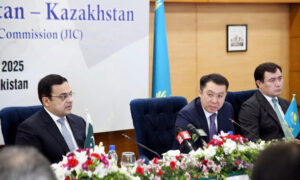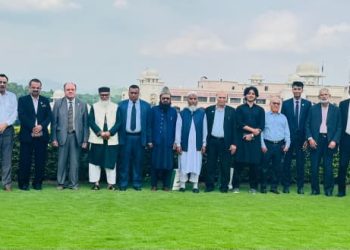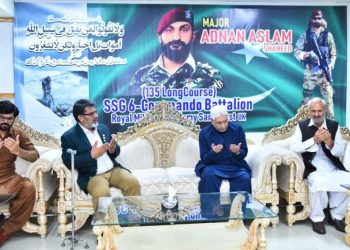ISLAMABAD ( WNAM REPORT ): The 13th Session of the Pakistan-Kazakhstan Joint Intergovernmental Commission (IGC) on Trade, Economic, Scientific, Technical and Cultural Cooperation was concluded in Islamabad. The session was co-chaired by Mr. Ahad Cheema, Federal Minister for Economic Affairs, and Mr. Marat Karabayev, Minister of Transport of the Republic of Kazakhstan. Both sides reviewed the progress made since the last meeting and agreed on a number of new initiatives to further strengthen bilateral cooperation. In this regard, protocols and MoUs were signed by both co-chairs.
Ahad Cheema, Minister for Economic Affairs, underscored the substantial progress made in bilateral relations between Pakistan and Kazakhstan during the 13th Session of the Joint Intergovernmental Commission. He highlighted the signing of key agreements, such as the Roadmap for Trade and Economic Cooperation and the Memorandum of Understanding on Electronic Trade, which will play a critical role in facilitating smoother trade flows and fostering broader economic collaboration. Cheema emphasized the importance of initiatives like the multimodal trade corridor and the formation of the Joint International Consortium of Logistics Companies, which will drive regional integration and enhance connectivity between the two countries. He expressed strong confidence that these efforts will contribute significantly to increasing bilateral trade and diversifying investments, setting the stage for a more interconnected and prosperous future.
Moreover, Minister Cheema reaffirmed Pakistan’s commitment to strengthening cooperation with Kazakhstan across a range of sectors, including transport, investment, culture, tourism, and youth engagement. He noted that the session had created a solid foundation for future collaborations, emphasizing that Pakistan is ready to fully support Kazakhstan’s growing interests in regional connectivity and economic integration. Cheema also highlighted the importance of people-to-people ties, particularly through the shared cultural heritage and growing cooperation in sports and tourism. He concluded by expressing deep gratitude to Kazakhstan for its valuable partnership and reiterated the strong desire to continue building on the momentum established during this session, which promises a brighter and more prosperous future for both nations.
In the light of above commitments, both sides agreed to accelerate the finalization of the Transit Trade Agreement and begin the practical implementation of the Roadmap for Trade and Economic Cooperation. The signing of the Memorandum of Understanding on Electronic Trade was also welcomed.
Connectivity and transport were key areas of focus. Both sides reaffirmed the importance of regional trade corridors, particularly the Kazakhstan-Turkmenistan-Afghanistan-Pakistan and Kazakhstan-Uzbekistan-Afghanistan-Pakistan routes. It was agreed to promote their use under the International Motor Transport Agreement. The successful launch of a multimodal trade corridor from Jebel Ali (UAE) to Almaty, via Pakistan, was acknowledged as a milestone in regional integration. The parties agreed to enhance cooperation between logistics companies and develop joint ventures to facilitate cross-border movement of goods through ports in Karachi, Qasim, and Gwadar.








